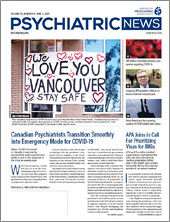The COVID-19 global pandemic is creating unprecedented disruption, uncertainty, and fear. As initial control efforts proved insufficient, sweeping business closures, national stay-at-home orders, and requirements for isolation and quarantine have disrupted all aspects of public life. While the effects of COVID-19 are being felt throughout households, businesses, nursing care facilities, and prisons, the primary battleground is our hospitals. Health care workers remain our best line of defense. The well-being of these health care workers is paramount to success in the battle against COVID-19 and ensuring the health and safety of our society.
Health care leaders are instrumental in setting the occupational conditions in which our health care workers function. Leaders exist at various levels within health care organizations and may include team leaders, department heads, and chief operating officers. The behaviors of leaders profoundly impact the functioning and psychological well-being of personnel as well as the trajectory of organizational recovery after disasters, such as COVID-19. During disasters, supportive leadership is associated with reduced psychological distress and lower rates of psychological disorders. When leaders encourage their personnel and focus on opportunities for growth during times of adversity, personnel report performing more effectively and experiencing higher levels of job satisfaction. The systematic study of previous outbreaks revealed that health care workers who received adequate training, effective communication, and social support experienced enhanced well-being and functioning.
Our understanding of the impact of leadership behaviors during times of crisis reveal important lessons learned to help guide health care leaders during COVID-19. Below are core elements of crisis leadership to enhance well-being, improve functioning, and optimize sustainment for health care workers:
•
Connection and communication: To be impactful, leaders must be present. Connecting regularly with personnel in their workspace provides reassurance and encourages a “one team” mentality. Effective communication of relevant and timely information treats anxiety in a crisis. Share what you know and what you don’t know. Don’t make things up as this undermines trust. Commit to finding answers and then promptly share them with the team.
•
Training and resources: Provide training in equipment, policies and procedures, and the anticipated exposure (death, dying, suffering) and normal responses (uncertainty, fear, anger, difficulty with sleep). Foster a supportive work environment where asking for help is a sign of strength. Ensure people doing the hard and dangerous work have what they need to feel safe, even if this comes at your personal cost. When the stakes are high, consider how you want people to remember you and “lead with the end in mind.”
•
Self-care and support: Self-care through regular sleep, meals, hydration, and exercise is critical for decision-making and problem-solving and also strengthens the immune system. Ensure your self-care by “putting on your own oxygen mask first” to lead by example, which encourages others to do the same. Encourage peer support and use of “battle buddies” who look out for one another. Ensure personnel know when and where to get help and eliminate barriers.
•
Grief and growth: Acknowledge the unique challenges of this event and the magnitude of loss. Recognize this through symbolic acts or rituals that honor health care workers and the lives of those lost. Seek opportunities to sustain system changes that serve patients and workers and improve preparedness for future events. Remind personnel of inner strengths and help them call on this during difficult times. Remain vigilant for the next pandemic wave, but look to the future with hope and a reminder that eventually this will end.
Health care leaders have the opportunity to profoundly and positively impact the well-being of health care workers and the patients within their care. Leadership during daily operations differs from what is required to effectively lead during times of crisis. Trusted principles and lessons learned must be leveraged as the outcome is too important to leave to chance alone. Ultimately, the effectiveness of health care leadership during this crisis will play a critical role in the health and safety of our nation. ■
The views expressed are those of the author and do not necessarily reflect the views of any other organization or entity. The author has no conflicts of interest or relevant disclosures.


